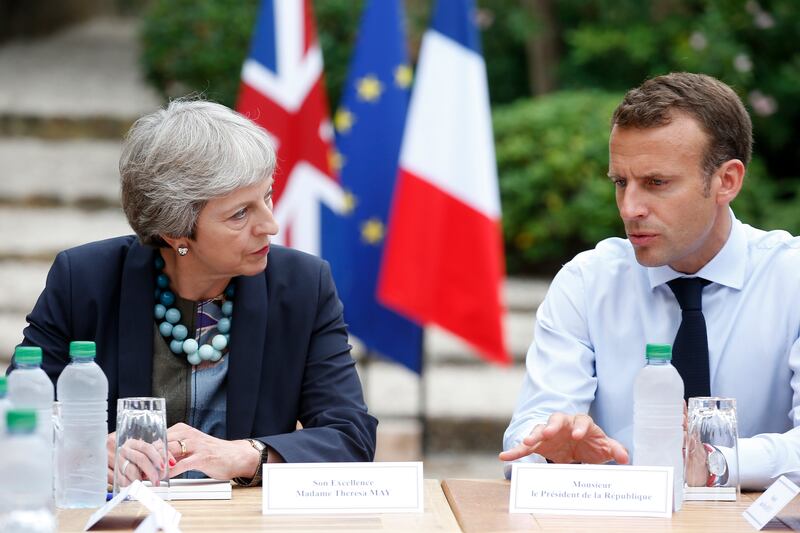The fundamental issue of our times came noisily to the surface in Paris on Sunday. No light was shed on it, but at least it made an appearance: the question of “nationalism” vs. “globalism.”
“Patriotism is the exact opposite of nationalism. Nationalism is a betrayal of patriotism.” This is French President Emmanuel Macron trying to give President Trump a lesson in elementary political morality at Sunday’s commemoration of the 100th anniversary of the armistice that ended the Great War. Trump had earlier embraced the label of “nationalist,” so there was no great subtlety involved in Macron’s reference.
Macron was understandably taking rhetorical advantage of the occasion of remembering the havoc wreaked by nationalism a century ago. But it is also true that a lot of history has happened since 1918. The 20th century has been described as “a century of horrors,” and it would be far too simple to ascribe all these horrors to the simple and general category of “nationalism.”
Obviously, a certain “internationalism” (look up “Comintern”) was also a major player in the destructive century. And you could say that Hitler’s “national socialism” had a certain, well, “international” dimension to it — Nazism was not exactly a “let us just mind our own business and take care of our own” style of nationalism, or of socialism. In any case, you don’t need to know very much history to understand why an American president might have trouble taking lessons in international responsibility from the French. So let’s just say that questions surrounding “nationalism” will not be decided by “history,” one way or another.
It is interesting, and I want to think even a bit promising, to find the word “patriotism” emerge from the noisy clamor between “globalism” and “nationalism.” If we can all agree that something called “patriotism” might be good (unlikely, I know), then we might begin to sort out conflict between globalism and nationalism. So Macron embraces “patriotism” but opposes it to “nationalism” and implicitly associates it with “globalism.” Meanwhile, Trump identifies patriotism with “nationalism” and opposes both to “globalism.”
I have to say that, if there were an actual argument here, Trump would have the better part of it. Macron’s problem — and one he shares with European elites generally — is that his “patriotism” has no content, and is, frankly, scarcely believable. This is after all the person who announced not long ago “there is no such thing as French culture.” “There is a culture in France,” he went on to explain, “and it is diverse.” In other words, instead of an identifiable culture, a shared (albeit complex and evolving) social fabric of beliefs and priorities, we (globalist “patriots”) have the abstraction of “diversity.”
Here was the nub of Macron’s anti-nationalist sermon: “By putting our own interests first, with no regard for others, we erase the very thing that a nation holds dearest, and the thing that keeps it alive: its moral values.” So true patriotism is based on morality. But (the globalist-patriot argument must hold) we have no common moral culture — except diversity. Our common morality is not to have a common morality. From the globalist point of view, to defend a shared national morality (a common culture, therefore a distinctive understanding of a nation’s interests) is the very essence of immorality, since morality consists in rising above a particular culture or morality.
The globalist morality, a kind of secular and universalist religion, defines itself against the particularity of peoples, the substance of any national moralities (or even the broad ethic of a merely Western civilization); it has no ethic but the anti-ethic of “diversity.”
The more prominent, quasi-official doctrine of this universalist religion is of course “human rights.” Now, each of us is understandably attached to his rights, but the problem is in defining them. Without some shared understanding of our humanity, some common moral culture, our rights become subject to the negative power of “diversity.” Thus “human rights” are used to justify both the equal presence of women in public life and the equality (or “diversity”) of a religion that bans women from the public space. The only reliable operational meaning of globalist “human rights” is the negation of a people’s right to govern itself according to a substantive idea of its common good. And the great beneficiaries of this negation are indeed global elites, corporate, bureaucratic and cultural.
President Trump resists the power of these global elites, and so he calls himself “nationalist.” But for this nationalism to grow into a true patriotism, it will have to be more than the negation of globalism. Patriotic nationalism needs an articulation of the common good.


